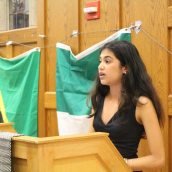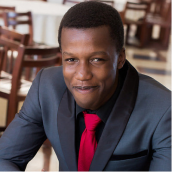Joseph Munyambanza: The story of a conqueror
As we sat for our lesson on a sweltering Tuesday afternoon, there was anticipation for the upcoming week-long break, obstructed only by the last lesson of the day. We sat for a while in a lazy stupor before our speaker arrived humbly apologising for his delay. Joseph Munyambaza was calm and composed as he began his initial talk on disparities of living. Despite appearing to be an average man who started by talking of ordinary sundries, he informed us that he was raised as a refugee and that it was education that propelled him to the position he is in today.
He began by narrating to us that life was free and full of enjoyment in the Congo. “There was plenty of food, I was always playing…” he recalls as he spoke of his six-year old self. Due to his age, he is now aware that he was shielded from most of the atrocities that must have taken place. His older siblings on the other hand, were not as fortunate. “My brother, who was a teenager at the time, was greatly disturbed by the events that took place…” Eventually, his older brother sought comfort in alcohol in an effort to forget what he had seen. Joseph’s family relocated to refugee camp in Western Uganda in a place called Hoima. Life was different and evidently, it was hard. The life of abundance and freedom was long gone and now the life of lack and want was all that there was. You can imagine the terrible living conditions in the refugee camp which was congested and dangerous. As he grew life seemed to eventually settle when tragedy struck. Joseph’s older sister passed away only a few days before exiting the refugee camp to attend university. What really moved me was the fact that she died under preventable circumstances. His sister died because his family did not have sufficient funds to pay for treatment.
This turning point propelled him to getting a placement in a high school outside the refugee camp where he was to begin to establish his academic prowess. He further explained that he knew how important his opportunity was so he would remain focused in his studies at all costs. Things were running smoothly throughout his years in high school with his school fees sorted out by the UNHCR. He was determined to also give opportunities to other refugee children who, just like him, were so full of potential. “When I was in my second year of secondary school, my friends and I wanted to enable other refugee children to access education. And so we started COBURWAS, a youth organization that represents Congo, Burundi, Uganda, Rwanda and Sudan. Refugees in the refugee camp we lived in came from these countries and we wanted to have a shared solution. All youth came together to think of solutions. Though we had many challenges we realised that lack of access to education was more dangerous. We started tutoring, which I did to enable children to get good grades and feel motivated to love school. We also worked for people to raise money to buy exercise books for the most vulnerable children in our midst. We were a club at first, but with time our programs expanded and we became a community-based organisation. The refugee community was of great help because they supported us with the little available and it meant so much in our small start.”
However, in his fourth and most senior year, his scholarship was withdrawn. “My education was initially supported by UNHCR in senior one but when I went to senior two they sent letters that UNHCR does not have more money to support education. Fortunately, a friend called Eric Glustrom who was starting an organisation helped me to complete senior four.” Even with a graduate certificate under his belt, he was unsure of what was to come next. Then, another whirlwind of events took place such that he was admitted to the ALA (African Leadership Academy) located in South Africa. This is an institution that is internationally recognised for producing innovators and entrepreneurs who are sure to make a positive impact within their home countries. Joseph says, “I had no dream of getting to a great school like ALA. I was already extremely grateful to be in my school that was the best in the district. And so even after being accepted to into ALA I still did not believe it until I landed in Johannesburg and was handed the key to my room. It was more than I could have ever dreamed of. And when I reached at ALA I wanted to be the best I could as a student, an ambassador to my fellow youth in the refugee camp and do well in class.”
All in all, his story was able to bring out the extent of the disparities of lives outside our own. The concept of war, forced migration and other forms of hardship is one that cannot be explained in a short period of time but were nevertheless highlighted in his talk. It is fascinating how a life can change simply as a result of joint efforts and self-motivation. By the end of his talk it was crystal clear that according to Joseph Munyambanza, education is a powerful tool.
By Bijou Mwaura, DP1
Ruhi Kamal Manek (Class of 2016): Advocating for Africa
Ruhi Kamal Manek, an alumnus of the Aga Khan Academies in Mombasa and now a sophomore at Yale University in the United States, took away one enduring lesson from the Academy: the importance of engaging in thoughtful and careful consideration of diverse opinions. She explains that it was her time at the Academy that forced her to reexamine her old-world views and believes that her new way of thinking as a citizen of the world was borne of her stay in residence at the school:
“Living with people from so many diverse backgrounds helped me appreciate differences in people. This experience further helped me feel comfortable interacting with people from diverse backgrounds and diverse cultures at Yale.”
Ruhi was born in Nairobi, Kenya and grew up in the small town of Eldoret. It was her desire to learn and challenge herself more that made her apply to the Academy.
“I could not think of a better place to do that than at the Academy,” Ruhi states. “Being admitted to the school was the beginning of a transformative journey for me - a defining moment in my academic and personal life.”
The Academy places immense importance on meaningful public service. Ruhi participated in numerous voluntary undertakings but it was involvement in the annual school-based deworming program in the impoverished Bombolulu area of Mombasa that had a lasting impact on her. Under this program, school children receive an oral dose of deworming medicine designed to lower their risk of infection by worms and thus enhance their health and school productivity.
“The experience opened my eyes,” Ruhi says. “The thought that something so trivial as administering a few drops of medicine in a child’s mouth can transform that child’s future was inspiring to me.”
Involvement in this program inspired Ruhi in many ways. Watching the children joyfully engage with life forced her to reflect on values of humility, modesty and gratification:
“As I stood among the children, I felt as though my heart had grown twice as large, making space for these beautiful souls. I was filled with an inexplicable amount of joy as I marveled at the contentment and optimism around me. Despite the conditions in which the children lived and learned, they were radiating with happiness. I was in awe. The whole experience reminded me of a quote by the Buddha: ‘The cessation of desire is the cessation of suffering.’”
After this experience at the Academy, Ruhi continued her volunteer work at Yale. She is part of the TEDxYale team and helps to organize seminars and conferences. She is a member of Yale UNICEF and is involved in fund-raising efforts to make a difference in children’s lives globally. Committed to women’s rights regarding education and leadership roles, Ruhi also joined the Yale chapter of the Circle of Women, a non-profit organization “that educates, inspires and empowers women to become leaders and peacemakers.”
Additionally, Ruhi is involved in developing a wellness curriculum for a girls’ secondary school in Orkeeswa, Tanzania, which promotes the ideas that healthy students are better learners and that focusing on wellness now can produce huge intergenerational benefits.
“My first year at Yale has undoubtedly been enhanced through my participation in activities that I have long been passionate about,” states Ruhi. She unequivocally credits the Academy’s International Baccalaureate (IB) curriculum and the residential program for her growth and personal development. “My journey at the Academy was one of the most intense yet fulfilling growth periods of my life. I think it is safe to say that it played a key role in helping me develop the person I am today.”
When asked what her aspirations are for the country of her birth, Ruhi radiates determination. “I want to help redefine the way in which the rest of the world views my country, and more particularly the African continent. I want to be an active agent in ensuring that our stories are no longer told for us but by us.”
She is also determined to promote education in her country. “I want to tackle the issue of the lack of education. I value nothing more than the education I have been so privileged to receive and the many opportunities that have come my way because of it. I wish to help provide the same for as many people as I possibly can in my country of origin and beyond.”
By Perviz Walji
Newsletter readers please click here to return to the newsletter (browser version)
Diploma Programme application form
Diploma Programme application form
Joshua Ekirikubinza's Speech - AKA, Mombasa's Graduation, 2015
Teachers, I would like to begin with you. I am not going to thank you right now. However, I will start by saying sorry. For every time we ducked when we saw you coming down the hall, knowing we were not going to hand in that piece of homework. For every time we extended that deadline so far that it became inexistent. For every time we treated the piece of paper we are about to receive as your problem and not ours, and for every opportunity to thank you that we missed, thank you for being there from the beginning and here with us at the very end.
Parents, thank you. Those two words come nowhere near expressing the gratitude I know that every single student seated in front of you feels. Thank you for the support, whether financial or emotional. Do not worry; the product of your labor is awe-inspiring. In front of you sit the pioneers of the next generation, the heroes who will shape the world and leave a resplendent legacy for decades to come. DP2s, I just made a lot of promises to your parents, your job is to turn those incredibly romantic notions I sent flying their way into reality. And while it may seem like I just placed an immense task on your shoulders, I only ask of you what you are more than capable of.
In two years you have overcome every single obstacle that the IBO managed to throw at you, even though I know you imagined they sat in a boardroom discussing how to make your lives as difficult as possible. Now you are at your graduation and I know a lot of you are probably wondering what it was all for. I sincerely hope you do not expect me to give you that answer. In fact I hope you realize that no one in this room or outside it can give you that answer. As cliché as it is to say, the only person who can answer that question is you. Why did you decide to do a program renowned for its rigor? I hope it is because somewhere inside yourself you believed that you do have the ability to do anything you set your mind to; which would make everything I promised earlier a piece of cake.
So if I have not made myself clear yet, the world is yours. It is yours to shape and mould, yours to save and re-vitalize or yours to ignore and let crumble. If there is one thing you should know going forward it is that you no longer have the luxury to sit back and watch. You had about eighteen years of your life to do just that and I hope you enjoyed it. Soon the decisions about the world we live in will be left up to you. Make sure that when you are attending the next generation’s graduation the legacy you hand over is one that you are proud of.
The way to such a legacy is of course no walk in the park. There will be challenges, but the greatest one, I believe, is the day you question how special you really are. The day you stop believing you can impact the world around you is the day that ability is eternally lost you. Do not let the world tell you what you can and cannot do. Do not subscribe to the bigotry and intolerance that runs rampant throughout the world, you are far too intelligent for that. Do not gauge your abilities by comparing yourself to someone else. If you look to your left or right you will find a classmate and a team mate, not your competition. You do not benefit from being better than the person sitting next to you. I do not often quote people because I am ambitious in that I hope to create a few of my own one day, but Ernest Hemingway once said “There is nothing noble in being superior to your fellow man; true nobility lies in being superior to your former self.” Thus the key to your success does not lie in being better than everyone but, and the administration in no way coerced me to say this, in having a growth mindset. Please do not be that dentist who argues you are more important than the engineer.
Be accepting of the people around you. You cannot hope to change the world if you cannot even begin to accept the people within it. We are different. That is a reality you will have to accept. Also, please remember when you re-shape the world you affect everyone. Every culture, every race, every ethnicity and every religion. It is a complex puzzle, remember that. You can only solve it if you understand it.
Do not your let your education amount to just a piece of paper. As the incredible sagacious Albert Einstein said, “Education is what remains after one has forgotten what one has learned in school.” When you read that over 8,000 people died in an earthquake in Nepal earlier this month, do you simply let that statistic ring through one ear and out the other? Or do you let such facts inform your decisions about what you want to do to change the world? Do not think accumulating wealth is the way you change the world either. If you think I am being dishonest then how about you consider that there are over 5 million millionaires in the US alone. There is a treat in it if you can name more than 100 of them. I believe you know less than 100 names because they have not done enough to change the world. Martin Luther King Junior died without any financial assets at all or a will, almost 50 years later we still revere him. In the end you deserve to have your name written down in the annals of history, not a checkbook.
Finally remember as wonderful as you are, there is only one of you. You are one piece in a seven billion piece puzzle. Try and fit as snuggly as possible, keep your elbows, knees and feet in a position that does not bother anyone else.
So as I conclude this intentionally overly verbose speech, I leave you with a simple fact. Those are crazy enough to believe they can change the world, are often the ones who do. So here’s to the crazy ones - we can disagree with them, hate them, love them, quote them glorify or vilify them. About the only thing you cannot do is ignore them because they change things. They push the human race forward. I hope that you are all crazy enough to do it.



